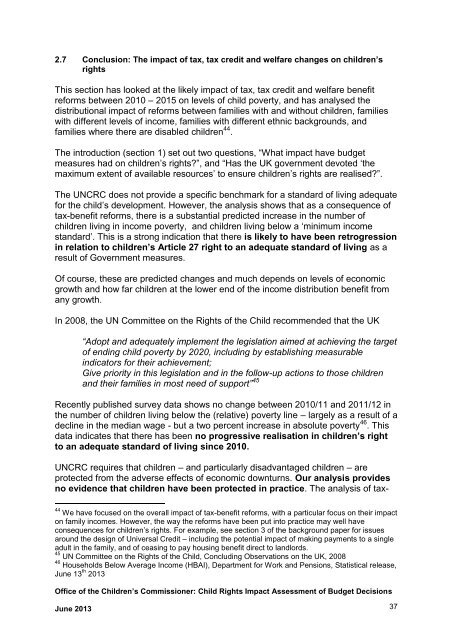force_download.php?fp=/client_assets/cp/publication/676/A_Child_Rights_Impact_Assessment_of_Budget_Decisions
force_download.php?fp=/client_assets/cp/publication/676/A_Child_Rights_Impact_Assessment_of_Budget_Decisions
force_download.php?fp=/client_assets/cp/publication/676/A_Child_Rights_Impact_Assessment_of_Budget_Decisions
You also want an ePaper? Increase the reach of your titles
YUMPU automatically turns print PDFs into web optimized ePapers that Google loves.
2.7 Conclusion: The impact <strong>of</strong> tax, tax credit and welfare changes on children’s<br />
rights<br />
This section has looked at the likely impact <strong>of</strong> tax, tax credit and welfare benefit<br />
reforms between 2010 – 2015 on levels <strong>of</strong> child poverty, and has analysed the<br />
distributional impact <strong>of</strong> reforms between families with and without children, families<br />
with different levels <strong>of</strong> income, families with different ethnic backgrounds, and<br />
families where there are disabled children 44 .<br />
The introduction (section 1) set out two questions, “What impact have budget<br />
measures had on children’s rights?”, and “Has the UK government devoted ‘the<br />
maximum extent <strong>of</strong> available resources’ to ensure children’s rights are realised?”.<br />
The UNCRC does not provide a specific benchmark for a standard <strong>of</strong> living adequate<br />
for the child’s development. However, the analysis shows that as a consequence <strong>of</strong><br />
tax-benefit reforms, there is a substantial predicted increase in the number <strong>of</strong><br />
children living in income poverty, and children living below a ‘minimum income<br />
standard’. This is a strong indication that there is likely to have been retrogression<br />
in relation to children’s Article 27 right to an adequate standard <strong>of</strong> living as a<br />
result <strong>of</strong> Government measures.<br />
Of course, these are predicted changes and much depends on levels <strong>of</strong> economic<br />
growth and how far children at the lower end <strong>of</strong> the income distribution benefit from<br />
any growth.<br />
In 2008, the UN Committee on the <strong>Rights</strong> <strong>of</strong> the <strong>Child</strong> recommended that the UK<br />
“Adopt and adequately implement the legislation aimed at achieving the target<br />
<strong>of</strong> ending child poverty by 2020, including by establishing measurable<br />
indicators for their achievement;<br />
Give priority in this legislation and in the follow-up actions to those children<br />
and their families in most need <strong>of</strong> support” 45<br />
Recently published survey data shows no change between 2010/11 and 2011/12 in<br />
the number <strong>of</strong> children living below the (relative) poverty line – largely as a result <strong>of</strong> a<br />
decline in the median wage - but a two percent increase in absolute poverty 46 . This<br />
data indicates that there has been no progressive realisation in children’s right<br />
to an adequate standard <strong>of</strong> living since 2010.<br />
UNCRC requires that children – and particularly disadvantaged children – are<br />
protected from the adverse effects <strong>of</strong> economic downturns. Our analysis provides<br />
no evidence that children have been protected in practice. The analysis <strong>of</strong> tax-<br />
44 We have focused on the overall impact <strong>of</strong> tax-benefit reforms, with a particular focus on their impact<br />
on family incomes. However, the way the reforms have been put into practice may well have<br />
consequences for children’s rights. For example, see section 3 <strong>of</strong> the background paper for issues<br />
around the design <strong>of</strong> Universal Credit – including the potential impact <strong>of</strong> making payments to a single<br />
adult in the family, and <strong>of</strong> ceasing to pay housing benefit direct to landlords.<br />
45 UN Committee on the <strong>Rights</strong> <strong>of</strong> the <strong>Child</strong>, Concluding Observations on the UK, 2008<br />
46 Households Below Average Income (HBAI), Department for Work and Pensions, Statistical release,<br />
June 13 th 2013<br />
Office <strong>of</strong> the <strong>Child</strong>ren’s Commissioner: <strong>Child</strong> <strong>Rights</strong> <strong>Impact</strong> <strong>Assessment</strong> <strong>of</strong> <strong>Budget</strong> <strong>Decisions</strong><br />
June 2013 37



